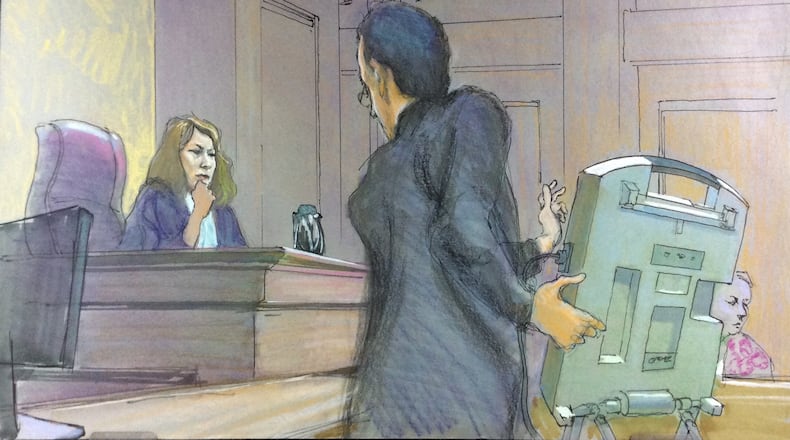A federal judge ruled Monday that Georgia can continue using electronic voting machines in November’s election despite concerns they could be hacked.
U.S. District Judge Amy Totenberg denied a request for an injunction that would have forced the state's 6.8 million voters to switch to hand-marked paper ballots.
Totenberg made her decision in an ongoing lawsuit from voters and election integrity organizations who say Georgia's direct-recording electronic (DRE) voting machines are untrustworthy and insecure. Georgia is one of five states that relies entirely on electronic voting machines without a verifiable paper backup.
Her 46-page order Monday said she was concerned about “voter frustration and disaffection from the voting process” if she had prohibited electronic voting machines just weeks before the election.
“There is nothing like bureaucratic confusion and long lines to sour a citizen,” Totenberg wrote.
Georgia election officials had warned of chaos if the state were forced to change to paper on short notice before a major election. Early voting begins Oct. 15 for the Nov. 6 election featuring the governor's race between Democrat Stacey Abrams and Republican Secretary of State Brian Kemp, who is responsible for elections administration.
Totenberg criticized state election officials, writing that they “had buried their heads in the sand” about the vulnerabilities of Georgia’s voting system.
Election officials said in court last week the government would have struggled to find money to buy enough paper ballots, count them in a timely manner, ensure accuracy and prevent long lines.
But the plaintiffs in the case said Georgia shouldn't risk moving forward with an election that's vulnerable to tampering from Russians or others.
They said Georgia’s touchscreens could be penetrated and election results changed without leaving a trace. Without a paper ballot backup, there’s no way to tell if an election is altered, and no way to correct potential errors.
One of the plaintiffs, Marilyn Marks of the Coalition for Good Governance, said government officials have failed to respond to repeated warnings about electronic voting systems.
“The defendants failed to make any efforts to prepare for secure November elections,” Marks said. “Although the concerns of a transition to paper ballots are exaggerated, the defendants can create a self-fulfilling prophecy of Election Day chaos and voter disenfranchisement.”
There's no evidence that Georgia's 27,000 touchscreen voting machines have been hacked during an election, but tech experts say malware could be written so that it's undetectable.
Kemp said state and local governments have been preparing for the election for months. He said Georgia’s electronic voting machines are secure.
“We’ve made it very clear that (paper ballots) would be a disaster for this election. That’s something that will throw us into chaos,” Kemp said.
Georgia was the first state in the country to switch to all-electronic voting devices in 2002. At the time, the technology was seen as a way to avoid the kind of problems seen in Florida during the 2000 presidential election, when ballots with hanging chads led to recounts.
Today, most voters in the United States cast their ballots on a system that includes a paper record that can be checked for accuracy.
Skepticism about electronic voting machines increased after the 2016 presidential election, when Russians attempted to interfere with the outcome.
In Georgia, a Russian agent visited election websites in Cobb and Fulton counties in October 2016, according to an indictment in July as part of special counsel Robert Mueller's investigation. The agent didn't gain access to state or county election systems, according to the Georgia Secretary of State's Office.
“It’s a huge risk for every Georgia voter. ... The current system is hopelessly unsecure,” said David Cross, an attorney for a group of Georgia voters who are plaintiffs in the lawsuit. “We read the decision as essentially saying it’s too late for something at this point, but for the 2020 elections, there will be a change.”
The Coalition for Good Governance will seek a ruling to mandate paper ballots for runoff elections Dec. 4, 2018, Marks said.
Georgia legislators are considering a transition to a paper-based voting system in time for the 2020 presidential election. They plan to consider bills next year to buy a system that uses either hand-marked paper ballots or touchscreens to fill in a paper ballot.
— AJC staff writer Greg Bluestein contributed to this article.
About the Author
Keep Reading
The Latest
Featured





